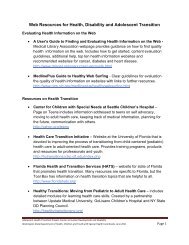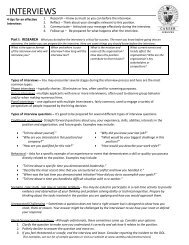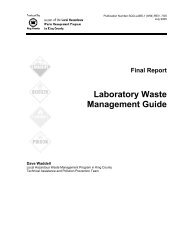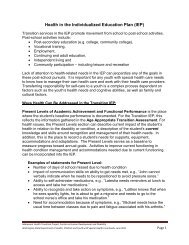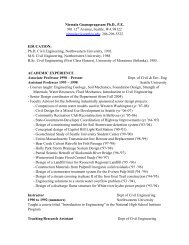SEATTLE UNIVERSITY COLLEGE OF NURSING NURS 304 ...
SEATTLE UNIVERSITY COLLEGE OF NURSING NURS 304 ...
SEATTLE UNIVERSITY COLLEGE OF NURSING NURS 304 ...
You also want an ePaper? Increase the reach of your titles
YUMPU automatically turns print PDFs into web optimized ePapers that Google loves.
7<br />
***A grade of C (2.0), that is 73%, is the minimum passing grade in all BSN Nursing<br />
Courses***<br />
Special Instructions:<br />
Cell phones and pagers must be turned "off" during class. Calls and pager messages are<br />
disruptive to me and the other students in the class.<br />
Test make-up procedures: If you are not able to take the test at the scheduled time, you must<br />
notify me by phone or e-mail prior to class. Failure to do so will forfeit your right to take<br />
the make-up test.<br />
If you are having difficulty studying for this class or taking exams, I encourage you to seek<br />
assistance from the Learning Resource Center in Loyola 100. Take advantage of this resource!<br />
Do not wait until you have failed 2 exams to seek help. They have tutors specifically for<br />
pathophysiology and can help you with test-taking strategies.<br />
Reading Assignments: You will be expected to know the basic anatomy and physiology of<br />
the body systems that we cover this quarter. In preparation for class, review A&P content you<br />
find necessary to be prepared for class. Regarding specific reading assignments, I recommend<br />
that you read the specific Chapters in Huether and McCance that correspond to the topics<br />
posted on ANGEL for each week. Some students find it useful to read before the specific topic is<br />
presented in patho for the week, others find it more useful to read after the lectures are<br />
presented. Find and do what is best to suit your learning style and comprehension of the material<br />
highlighted in class.<br />
Seven Tips for Thriving in Pathophysiology:<br />
1. Know the Usual/Normal: Review Anatomy & Physiology regularly.<br />
2. Know the Language: Make sure you understand all the terminology used in lecture and<br />
that you read in the text. Study with a medical dictionary by your side.<br />
3. Identify your Questions: Review your lecture notes within 48 hours of class and identify<br />
the topics about which you have questions or feel muddled.<br />
4. Participate: Attend lecture, create study groups. Ask your questions! Explain concepts to<br />
each other. The best way to imprint new knowledge in your brain is to try to teach it to<br />
somebody else!<br />
5. Master the Big Themes: Work on understanding the “big themes” in pathophysiology:<br />
inflammation, neoplasia, genetic vs. environmental contributions to illness.




